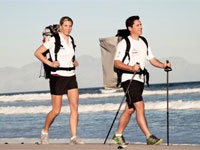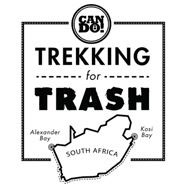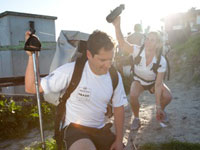
Top stories






More news


Marketing & Media
Ads are coming to AI. Does that really have to be such a bad thing?














Howard, co-founder of Chez Gourmet, and Baretta, strategic business manager at The Creative Counsel, are ordinary South Africans who have a passion for adventurous travel and a strong desire to drive positive social change. Respectively, they've chosen to tackle litter for different reasons.
"Fundamentally, Camilla and I have always wanted to combine our passions - something we've really wanted to do, with something we'd really like to change about society. We did some research and looked a bit deeper in terms of the reasons why people litter and what litter means to society," explained Baretta.
He believes strongly in the Broken Windows theory, which states that "maintaining and monitoring urban environments in a well-ordered condition may stop further vandalism and escalation into more serious crime".1
"If we can clean up South Africa, we can maybe reduce crime. Now there are obviously various other reasons as well; there's the social, environmental and the economic reasons to try to reduce litter, but I think those are a lot more well known; fundamentally it's about an attitude of respect," said Baretta.
Howard, having participated in the Lanka Challenge in Sri Lanka, as well as summiting Kilimanjaro barefoot in aid of the Red Cross Children's Hospital, is an adventure junkie, but it's not just for the kicks.
"I realised that you grow as a person when you push your boundaries and you're out of your comfort zone, and was so keen do another adventure on a bigger scale, and also try to make a real difference; so that's how Trekking for Trash was created a-year-and-a-half ago, and we've been working on it ever since," Howard said.

Embarking on the trek, their plan is to wake up every morning at 6am and walk between 18 to 35km daily. One person will carry the bin on their back, while the other carries the food and water for the day. The aim is to fill the bin with as much litter as possible and also to identify problem areas and encourage communities in the vicinity to make an ongoing effort to keep them clean.
"We're going to set ourselves targets in terms of weight of waste collected, number of people following us on Facebook, number of people reached, number of people engaged, number of column centimetres in the media, but that's quite a superficial way of measuring success, because you are not actually measuring the change. We're measuring what we're doing to create awareness, but it's very difficult to measure change in perceptions. The strongest motivation for us would be to see how many other people we ignite to do something similar in terms of our cause," said Baretta.
With awareness as the duo's number one priority, they'll be visiting 15 schools to perform a skit and install recycling depots on the premises through their sponsor, Collect-a-Can. The schools receive money for all the cans they collect; the school that collects the most cans will receive a cash prize. They're also tapping quite heavily into social media, using Facebook and Twitter to show people how dirty the country is - geotagging areas that's too big of a job for just two and challenging people to go to those areas to clean up.
There will be five organised beach clean-ups: two in Cape Town, and one in East London, Port Elizabeth and Durban.
"We have a lot of Home Channel coverage as well; we're doing a documentary showing people at home how to recycle and why they need to recycle, and showing them how beautiful our country is, and almost giving them no choice but not to litter," said Baretta.

They also plan to deliver a letter from the Department of Environmental Affairs to the local municipalities on foot, in a fashion similar to the Khoisan messengers, saying: "We've walked 2000km to get to your door and this is what the last municipalities have committed to do in order to clean up South Africa. What are you going to do?" On a national level, they're raising funds to support informal waste collectors providing them with protective gear, reflective outfits, gloves and also the skills to develop their small businesses into bigger businesses.
To prepare mentally and physically for the journey, Baretta and Howard are walking as much as possible, hitting the gym and reading up on those who have undertaken similar journeys.
"We're meeting with Dr Ross Tucker, who's done a whole thesis on barefoot running and being barefoot over a long distance, so he's going to give us some tips, and we've seen a chiropractor who's given me a bunch of exercises to do to help ITB and stabilise, as we're going to be on a slope pretty much the whole way. Mentally, I think we're just trying to read as many motivational, aspirational books of people who have done these things and try to learn from their mistakes - and then we'll just take it as it comes," said Howard.
With seven months of trekking ahead of them, Howard and Baretta are glad to have several sponsors behind them: Nampak BevCan, Nampak BevFood and Collect-a-Can have collectively formed an organisation called Can Do, which is the headline sponsor; it is funding the social media platforms and providing money to keep the duo nourished enough to complete their journey. Product sponsors include Nokia, Hi-tec, Energizer and Vodacom.
"Firstly through our clean-ups - and we are asking people to donate to Collect-a-Can, which will then be supporting informal waste collectors and recycling mechanisms," said Howard.
"Follow us on Facebook and Twitter, because we'll be uploading our content, we'll be giving you interesting facts about recycling, showing you how to recycle as we go. We're also encouraging people to join us on more than just the beach clean-ups. If you want to come and walk for two days, please feel free - we'd love you to bring a plastic bag and help us clean up," said Baretta.
Follow the Trekking for Trash journey via Facebook: www.facebook.com/TrekkingForTrash and Twitter: @trekking4trash.
1Wikipeadia: Broken windows theory
